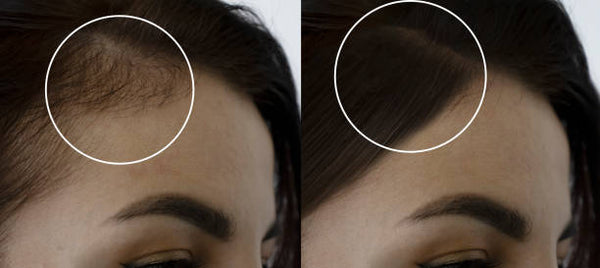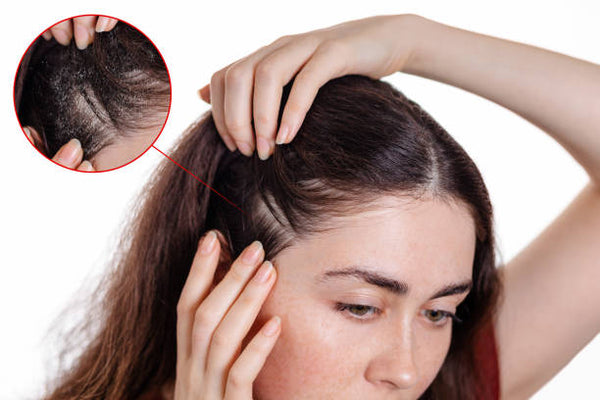Postpartum Stress and Hormonal Changes: Impact on Hair Loss and Scalp Health

Motherhood brings immense joy and new experiences, but it also comes with its challenges—especially when it comes to hair health. Postpartum hair loss is a common issue faced by many new mothers, often caused by a combination of hormonal shifts and the stress that accompanies caring for a newborn. Understanding how these factors impact the hair growth cycle and scalp health is crucial to managing and recovering from postpartum hair shedding.

How Postpartum Hormonal Changes Affect Hair
After childbirth, a woman’s body undergoes dramatic hormonal changes, which can significantly impact hair growth and shedding. One of the most significant hormones involved is estrogen, which has a direct effect on hair health.
1. The Role of Estrogen
During pregnancy, high levels of estrogen promote hair growth and retention, leading to thicker, fuller hair. However, after delivery, estrogen levels drop rapidly, triggering the shedding phase of the hair growth cycle. This sudden shift can cause an excess of hair to enter the telogen (resting) phase, leading to noticeable hair loss several months postpartum.
2. Telogen Effluvium
The condition commonly known as postpartum hair loss is often classified as telogen effluvium, a form of hair shedding caused by a disruption in the hair growth cycle. Under normal conditions, only a small percentage of hair follicles are in the shedding phase, but during the postpartum period, the number of follicles affected by this phase increases, resulting in noticeable hair thinning and shedding.
3. Androgenic Hormones
In some cases, hormonal fluctuations may also lead to an increase in androgenic hormones (such as testosterone), which can affect hair follicles and contribute to thinning, particularly along the hairline and crown of the head. This can sometimes exacerbate hair loss in those already predisposed to androgenetic alopecia (pattern baldness).
The Impact of Postpartum Stress on Hair Health
While hormonal changes play a primary role in postpartum hair loss, stress can also significantly contribute to shedding and thinning during this time. The stress of adjusting to motherhood, sleepless nights, and the pressure of caring for a newborn can trigger or exacerbate hair shedding.
1. Cortisol and Hair Follicles
When the body is stressed, cortisol levels rise, which can have a direct impact on hair growth. Chronic stress increases the amount of cortisol circulating in the body, which disrupts the hair growth cycle. Elevated cortisol levels can shrink hair follicles, causing them to produce thinner, weaker hair strands and potentially causing hair to fall out prematurely.
2. Stress-Induced Telogen Effluvium
In some cases, stress alone can trigger telogen effluvium, where more hair follicles prematurely enter the shedding phase, leading to diffuse hair loss. The combination of postpartum stress and hormonal changes can lead to an exacerbated version of this condition, resulting in more noticeable thinning or shedding of hair.
3. Inflammatory Response
Stress can also create an inflammatory response in the body, which affects the scalp. Inflammation can disrupt the normal functioning of hair follicles and contribute to hair loss. The scalp may become irritated, inflamed, and even itchy, making it difficult to maintain a healthy environment for hair growth.
Managing Postpartum Hair Loss
While postpartum hair loss is often temporary and resolves over time, there are several strategies that can help manage hair health and promote recovery during this challenging period.
1. Nourishing the Hair with Nutrients
Proper nutrition plays a vital role in supporting hair health during the postpartum period. Ensuring that you have a balanced diet with adequate levels of vitamins and minerals can promote hair regrowth and strengthen existing hair. Key nutrients to focus on include:
- Biotin: Supports hair strength and growth.
- Vitamin D: Promotes follicle health and hair cycle regulation.
- Iron: Prevents hair thinning caused by iron deficiency, which can occur postpartum.
- Zinc: Encourages healthy hair growth and supports scalp function.
2. Stress Management
While it may seem overwhelming, managing stress is essential for maintaining healthy hair during the postpartum period. Incorporating stress-reducing activities such as mindfulness, yoga, and regular physical activity can help reduce cortisol levels and promote overall well-being. Taking time for self-care and relaxation can also support emotional health, which in turn helps manage hair loss.
3. Scalp Care and Stimulating Hair Growth
Regular scalp massages can help increase blood flow to the hair follicles, promoting a healthy scalp environment for hair growth. Using gentle, soothing scalp oils like argan oil or peppermint oil can provide both hydration and stimulation to the follicles. Minoxidil, a topical treatment, may also be considered under a doctor’s guidance to help encourage hair regrowth in more severe cases of postpartum shedding.
4. Bond Repair Products for Strengthening Hair
To combat the physical damage caused by hair shedding, bond repair products can be incredibly helpful. These products are designed to repair and strengthen hair at the molecular level, making hair strands more resilient and less prone to breakage.
- Key Ingredients: Hydrolyzed proteins, keratin, and amino acids. These ingredients work to repair the internal structure of the hair, improving its strength and elasticity during recovery from hair shedding.
How Bond Repair Products Help During Postpartum Hair Loss
1. Strengthening Hair During the Shedding Phase
Postpartum hair loss often leads to weaker, thinner strands. Bond repair products help restore the integrity of each strand, ensuring that hair remains strong and less prone to breakage during the shedding phase.
2. Nourishing and Rebuilding Hair Bonds
As hair follicles experience stress and shedding, the internal bonds within the hair can weaken, leading to breakage. Bond repair treatments help rebuild these broken bonds, improving the hair’s overall strength and reducing the risk of further damage as the hair regrows.
3. Restoring Shine and Softness
Hair that has experienced postpartum shedding often looks dull and lackluster. Bond repair products infuse hair with moisture and nutrients, helping to restore shine, softness, and vitality, even while it’s in the process of regrowing.
Final Thoughts
Postpartum hair loss is a natural and temporary condition that many new mothers experience, triggered by hormonal changes and stress. While this phase can be frustrating, understanding the cause and implementing a solid hair care routine, including proper nutrition, stress management, and the use of bond repair products, can significantly aid in recovery. With the right approach, you can restore the health and vitality of your hair and enjoy a full head of strong, beautiful hair once again.
FAQ
1. Is postpartum hair loss permanent?
No, postpartum hair loss is typically temporary. Most women experience a regrowth of hair within six to twelve months after giving birth. However, the extent and duration of hair shedding can vary from person to person.
2. Can stress make postpartum hair loss worse?
Yes, chronic stress can contribute to hair loss by increasing cortisol levels, which disrupt the hair growth cycle. Reducing stress through self-care practices can help manage and minimize the impact of postpartum hair loss.
3. How can I prevent hair thinning during pregnancy?
Maintaining a balanced diet rich in vitamins and minerals, managing stress, and using gentle, nourishing hair care products can help support hair health during pregnancy. It’s also important to avoid harsh chemicals or treatments that could weaken hair.
4. Should I use bond repair products for postpartum hair loss?
Yes, bond repair products can be very beneficial during postpartum hair loss. These treatments can strengthen hair, reduce breakage, and promote healthier regrowth, helping to support the recovery of your hair during the postpartum period.




